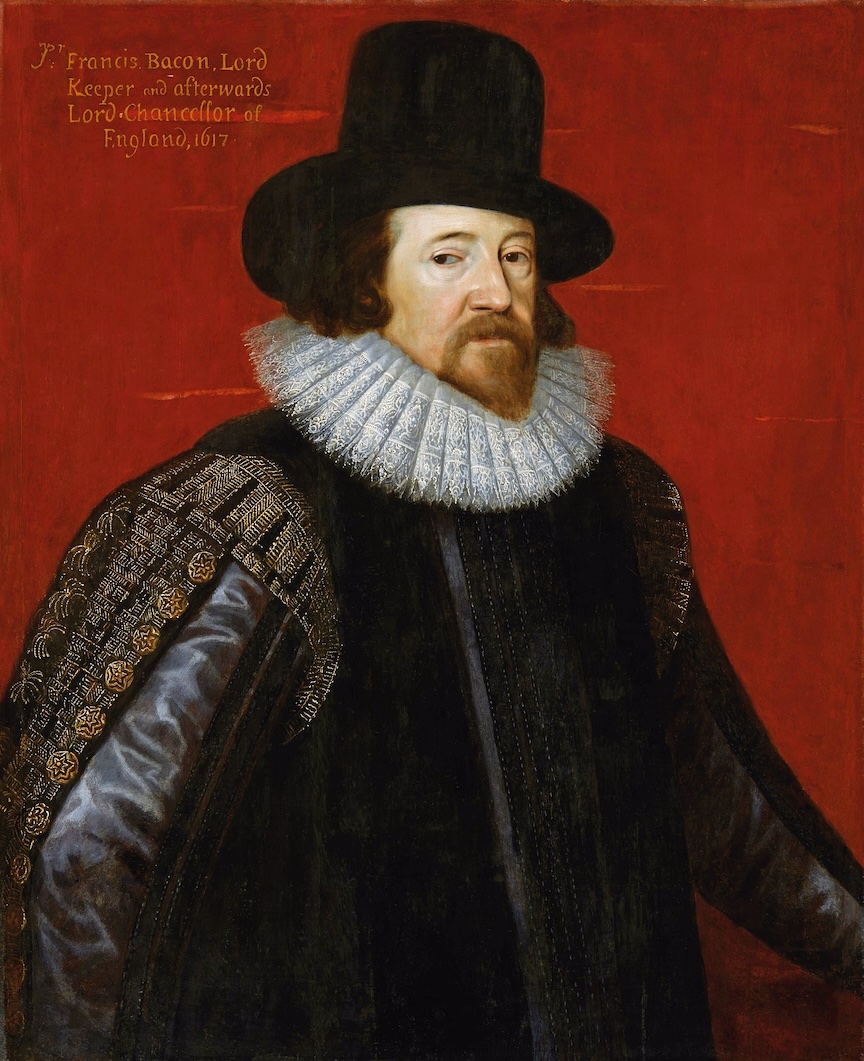Francis Bacon (1561-1626)

Baron Verulam of Verulam, Viscount St. Albans. English writer, philosopher and statesman. Among the many posts Bacon held: member of Parliament, commissioner for the union of Scotland and England, solicitor-general, attorney-general, privy counsillor, and Lord Chancellor. Among his philosophical beliefs: truth is derived from facts, not authority; experience gives rise to knowledge. He emphasized the importance of experimentation to explain nature.
Francis Bacon, born on January 22, 1561, in London, England, was an English philosopher, statesman, scientist, and author. He is widely regarded as the father of empiricism and one of the most significant figures in the development of the scientific method. His works laid the foundation for the modern scientific approach, emphasizing observation, experimentation, and inductive reasoning.
Francis Bacon was born into a prominent family. His father, Sir Nicholas Bacon, was the Lord Keeper of the Great Seal, and his mother, Anne Cooke Bacon, was a learned woman with strong Puritan beliefs. Bacon was educated at Trinity College, Cambridge, beginning at the age of 12. During his time there, he became disillusioned with the traditional Aristotelian philosophy taught at the university, which he found to be overly theoretical and disconnected from practical experience.
After leaving Cambridge, Bacon enrolled in Gray's Inn in 1576 to study law, following in his father's footsteps. However, his education was interrupted when he accompanied the English ambassador to France, Sir Amyas Paulet, as part of his diplomatic mission. Bacon spent two and a half years in France, where he gained insights into European political affairs and became interested in the reform of knowledge and learning.
Upon his return to England in 1579, after his father's sudden death, Bacon found himself in financial difficulties. He sought a career in law and politics to secure his livelihood. Bacon quickly rose through the ranks, becoming a Member of Parliament in 1581, representing various constituencies over the years. Despite his political ambitions, Bacon's career was often hindered by his outspoken criticism of the government and his lack of powerful patrons.
In 1603, when James I ascended to the English throne, Bacon's fortunes began to improve. He was knighted in 1603 and appointed as Solicitor General in 1607, Attorney General in 1613, and Lord Keeper of the Great Seal in 1617. In 1618, he was made Lord Chancellor, the highest judicial officer in England. Bacon was also created Baron Verulam in 1618 and Viscount St. Albans in 1621.
However, Bacon's political career ended in disgrace in 1621 when he was accused of accepting bribes in his capacity as Lord Chancellor. He was fined, imprisoned briefly in the Tower of London, and banned from holding public office again. Bacon admitted to the charges but claimed that he was merely following the common practices of the time.
Bacon's most enduring legacy lies in his contributions to philosophy and the development of the scientific method. Dissatisfied with the prevailing scholastic methods of his time, which relied heavily on deductive reasoning from established authorities, Bacon advocated for an empirical approach to knowledge. He argued that knowledge should be derived from careful observation and experimentation, followed by the formulation of general principles based on inductive reasoning.
Bacon's ideas were most fully articulated in his works *Novum Organum* (1620) and *The Advancement of Learning* (1605). In *Novum Organum*, Bacon introduced the concept of the "idols"—systematic biases that hinder human understanding—such as the "Idols of the Tribe" (common human biases), the "Idols of the Cave" (individual biases), the "Idols of the Marketplace" (misuse of language), and the "Idols of the Theatre" (adherence to dogma). He argued that these biases must be overcome to gain true knowledge.
Bacon also envisioned the creation of a new scientific institution dedicated to the empirical investigation of nature. This vision was later realized in the establishment of the Royal Society of London in 1660, which became one of the world's leading scientific organizations.
After his fall from political power, Bacon devoted the remainder of his life to writing and scientific inquiry. He continued to advocate for his method of empirical investigation and produced several works, including *The New Atlantis*, an unfinished utopian novel that depicted a society dedicated to scientific discovery.
Francis Bacon died on April 9, 1626, from pneumonia contracted while experimenting with the preservation of meat by freezing it. His contributions to the development of modern science and philosophy have had a lasting impact, earning him the title "Father of Empiricism." Bacon's insistence on the importance of observation, experimentation, and inductive reasoning helped lay the groundwork for the scientific revolution and the modern scientific method.
 >
>